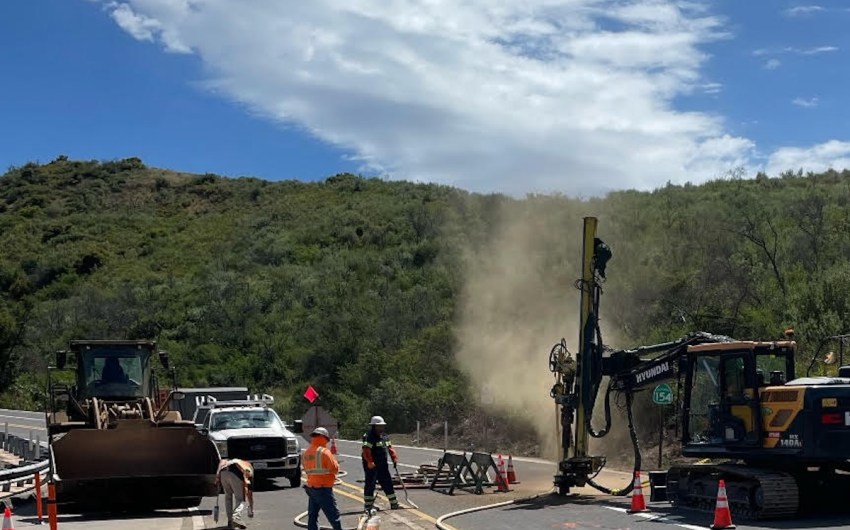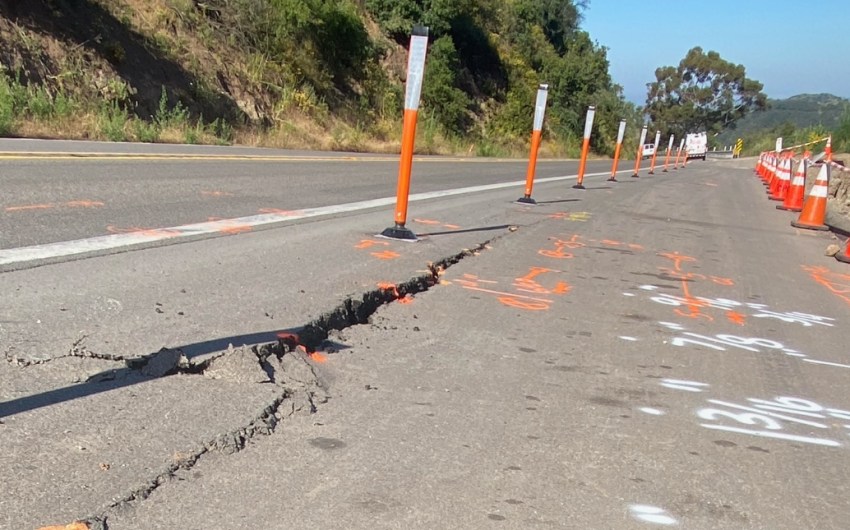Lompoc Cannabis Lab Will Pay $1.3 Million Penalty for Air Pollution
Operator Will Install State-of-the-Art Clean-Air Technology, Setting Statewide Standard, County Officials Say

Central Coast Agriculture, the operator of a large cannabis manufacturing lab in Lompoc, will pay $1.3 million to the Santa Barbara County Air Pollution Control District (APCD) to settle penalties associated with clean air violations, authorities said Thursday.
From 2020 through 2023, district officials said, the lab at 1201 West Chestnut Avenue and 1200 West Laurel Avenue in Lompoc was a major source of reactive organic compounds — gases that contribute to the production of ozone on hot, sunny days.
The Lompoc lab is believed to be one of the largest in the county, if not the state. For several years, despite multiple warnings and notices of violation, it was operating without permits or “best available” technology for air pollution control, said Aeron Arlin Genet, the APCD executive director.
In 2020 alone, she said, the lab released 135 tons of ozone precursor gases into the outside air, or twice as much as all the gas stations in the county taken together. Ozone is a colorless, odorless gas that can trigger sore throats, shortness of breath, and coughing.
“The magnitude of this settlement reflects the significance of the violations and the amount of emissions over three years,” Arlin Genet said.
Last October, Thomas Martin, CEO of Central Coast Agriculture (CCA), narrowly averted a district order to shut down the Lompoc lab by finally turning in a complete application for an operating permit. Today, the lab, which employs 122 people in two warehouses, is in compliance with district regulations and working to install state-of-the-art clean-air technology.
“As we dug in to address the issues we faced with the district, we learned a lot about how to improve our operations, and this collaborative effort with the APCD and with other regulators has been humbling and productive,” Martin said on Thursday. “We have worked closely with the district to put this matter behind us and appreciate their professionalism in guiding us to achieve compliance.… Despite the extensive work and costs to innovate, we are proud of the end result.”
Cannabis manufacturing labs typically “flare off” or burn gas byproducts in the outside air. At the Central Coast Agriculture lab, in contrast, 97 percent of the solvents such as butane and ethanol that are used to extract oils and clean the equipment will be recaptured and reused, rather than being released into the atmosphere, Arlin Genet said. By September, she said, the new technology at the Lompoc lab will be setting a new standard for the cannabis manufacturing industry in California.
“We’re just happy to be where we are,” Arlin Genet said. “A lot of progress has been made. CCA has come to the table and made commitments to significantly reduce the emissions of their operation.”
Penalties Still Pending
In addition to the $1.3 million, which is due on Friday, Central Coast Agriculture is facing potentially hefty penalties for illegally running portable generators at its cultivation sites west of Buellton between 2020 and mid-2021, spewing diesel exhaust into the air for nearly a year. The generators have long since been removed, but settlement discussions over monetary penalties are still ongoing with the county District Attorney’s Office.
Up until recently, Central Coast Agriculture was one of the largest cannabis operations in the county, with two operations on 54 acres in the Sta. Rita Hills wine country. This February, however, Martin opted not to renew the annual county business license for the company’s 24-acre “grow” at 5645 Santa Rosa Road. Central Coast Agriculture is still growing cannabis on 30 acres at 8701 Santa Rosa Road.
Of this week’s $1.3 million, the district will put $325,000 into its Clean Air Fund for projects that improve the air quality in Lompoc, Arlin Genet said. Another portion will be set aside to expand district inspections of cannabis processing and manufacturing operations, she said, adding: “It’s going to take us a few years to ensure that we are equitably regulating the cannabis industry, countywide.”
Melinda Burns is an investigative journalist with 40 years of experience covering immigration, water, science, and the environment. As a community service, she offers her reports to multiple publications in Santa Barbara County, at the same time, for free.
Premier Events
Fri, Jun 28
7:00 PM
Santa Barbara
Unity Singers’ Summertime Fun Concert
Thu, Jul 04
4:30 PM
Santa Barbara
Flip-flops & Fireworks BBQ at Hilton Santa Barbara
Fri, Jun 28
2:00 PM
Santa Barbara
Santa Barbara Greek Festival
Sat, Jun 29
2:00 PM
Santa Barbara
Santa Barbara Wine + Food Festival® 2024
Sat, Jun 29
2:00 PM
Santa Barbara
Read with Pride! – Children’s Book Reading
Sat, Jun 29
7:30 PM
Santa Barbara
Wasted Potential Presents: Solstice Stand-Up
Sun, Jun 30
6:00 PM
Santa Barbara
Free Contra Dance-Whole Hog band-Carrillo Ballroom
Mon, Jul 01
5:00 PM
Santa Barbara
Give a Hoot! A Plant-Powered Benefit for Rooted SB
Wed, Jul 03
1:30 PM
Santa Barbara
Dungeons & Dragons for Tweens
Thu, Jul 04
9:00 AM
Santa Barbara
St Andrews 4th of July Pancake Breakfast
Thu, Jul 04
5:00 PM
Santa Barbara
4th of July Concert Presented by PCVF
Fri, Jul 05
8:30 PM
Santa Barbara
Jaws Sun, Surf and Cinema: FREE Summer Films
Fri, Jun 28 7:00 PM
Santa Barbara
Unity Singers’ Summertime Fun Concert
Thu, Jul 04 4:30 PM
Santa Barbara
Flip-flops & Fireworks BBQ at Hilton Santa Barbara
Fri, Jun 28 2:00 PM
Santa Barbara
Santa Barbara Greek Festival
Sat, Jun 29 2:00 PM
Santa Barbara
Santa Barbara Wine + Food Festival® 2024
Sat, Jun 29 2:00 PM
Santa Barbara
Read with Pride! – Children’s Book Reading
Sat, Jun 29 7:30 PM
Santa Barbara
Wasted Potential Presents: Solstice Stand-Up
Sun, Jun 30 6:00 PM
Santa Barbara
Free Contra Dance-Whole Hog band-Carrillo Ballroom
Mon, Jul 01 5:00 PM
Santa Barbara
Give a Hoot! A Plant-Powered Benefit for Rooted SB
Wed, Jul 03 1:30 PM
Santa Barbara
Dungeons & Dragons for Tweens
Thu, Jul 04 9:00 AM
Santa Barbara
St Andrews 4th of July Pancake Breakfast
Thu, Jul 04 5:00 PM
Santa Barbara
4th of July Concert Presented by PCVF
Fri, Jul 05 8:30 PM
Santa Barbara

























